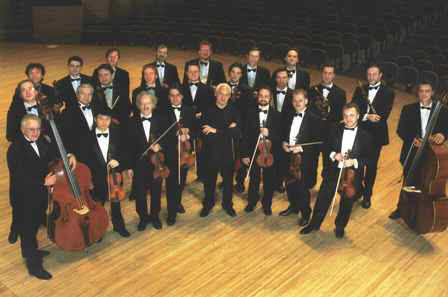Moscow Virtuosi’s warmth and bravura charm Arsht Center audience
Violinist-conductor Vladimir Spivakov and the Moscow Virtuosi Chamber Orchestra offered a lively, tasting menu of intimate, melodious scores Wednesday night at the Arsht Center. Many of Spivakov’s Russian compatriots were part of the large audience that roared its approval throughout the program. Indeed the twenty-five string players that form the core of this ensemble match their leader’s virtuosity and display the finely-honed sensibilities of the best string quartets and chamber groups.
Spivakov commenced the evening on a high note with an unabashedly romanticized performance of Vivaldi’s Violin Concerto in E minor, RV 273. His tone still silken and bowing fleet and agile, Spivakov eschewed the vibratoless, fiercely rhythmic approach of many period-instrument ensembles. The violinist took subtle liberties in shaping Vivaldi’s melodic lines while avoiding the affected exaggeration of a bye gone era. The long-limbed beauty and purity of Spivakov’s playing in the Largo was particularly outstanding. His warm-hearted, personalized interpretation offered a welcome alternative to the political correctness of the more extreme elements of the early music movement.
The jaunty melodies of the opening movement of Rossini’s Sonata No. 3 in C Major for strings are reminiscent of the overtures to the composer’s comic operas and the ensemble played them to the hilt in a finely varnished traversal. Spivakov’s rapid tempo for the final movement displayed his group’s precision at top speed but robbed the music of some of its impish charm. A bravura double bass solo incisively demonstrated this darkest of string instruments can spin a melodic line with taut dexterity.
Boccherini wrote some lovely chamber works and important repertoire for guitar and cello. Some of his symphonies are tedious, formulaic concoctions but the Symphony No. 4 in D minor (La Casa del Diavolo) is one of his better efforts. The tempestuous final movement directly quotes the Dance of the Furies from Gluck’s opera Orfeo ed Euridice for its main thematic material. Spivakov pulled out all the stops, whipping the music into a frenzy. Here the group’s wind players proved less impressive with inconsistent horns and veiled-sounding oboes reminiscent of Russian orchestras of the 1950s.
A good Russian ensemble playing Tchaikovsky can be a unique experience and the Moscow band’s version of the Serenade for Strings did not disappoint. Spivakov set a whirlwind pace for the opening movement. A welcome tinge of melancholy inflected the familiar waltz while the Elegie was appropriately the performance’s centerpiece, rendered with impassioned fervor and depth in a uniquely Russian manner. The unusually dark sonority of the ensemble’s violas stood out among superb playing across the board. Spivakov led the players into overdrive in the edge-of-the-seat finale but the sheer conviction of the performance carried the day.
Among the encores, one of Tchaikovsky’s winter pieces offered a lush outpouring of song while a tautly driven ride through Brahms’ Hungarian Dance No. 5 seemed closer to the Volga than the Danube. The program concluded with Piazzolla’s Libertango rendered more as neo-Classical vignette than sultry Latin period piece.
Posted in Performances
Leave a Comment
Thu Nov 25, 2010
at 10:51 am
No Comments





